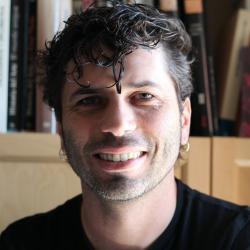In our second instalment of the Data Diversity Podcast, we are joined by archaeologist Dr Alfredo Cortell-Nicolau, a Senior Teaching Associate in Quantitative and Computational Methods in Archaeology and Biological Anthropology at the McDonald Institute for Archaeological Research and Data Champion.
As is the theme of the podcast, we spoke to Alfredo about his relationship with data and learned from his experiences as a researcher. The conversation also touched on the different interpersonal, and even diplomatic, skills that an archaeologist must possess to carry out their research, and how one’s relationship with individuals such as landowners and government agents might impact their access to data. Alfredo also sheds light on some of the considerations that archaeologists must go through when storing physical data and discussed some ways that artificial intelligence is impacting the field. Below are some excerpts from the conversation, which can be listened to in full here.
I see data in a twofold way. This implies that there are different ways to liaise with the data. When you’re talking about the actual arrowhead or the actual pot, then you would need to liaise with all the different regional and national laws regarding heritage and how they want you to treat the data because it’s going to be different for every country and even for every region. Then, of course, when you’re using all these morphometric information, all the CSV files, the way to liaise with the data becomes different. You have to think of data in this twofold way.
Dr Alfredo Cortell-Nicolau
Lutfi Othman (LO): What is data to you?
Alfredo Cortell-Nicolau (ACN): In archaeology in general, there are two ways to see the data. In my case for example, one way to see it is that the data is as the arrowhead and that’s the primary data. But then when I conduct my studies, I extract lots of morphometric measures and I produce a second level of data, which are CSV files with all of these measurements and different information about the arrowheads. So, what is the data? Is it the arrowhead or is it the file with information about the arrowhead? This raises some issues in terms of who owns the data and how you are going to treat the data because it’s not the same. In my case, I always share my data and make everything reproducible. But when I share my data, I’m sharing the data that I collected from the arrowheads. I’m not sharing the arrowheads because they are not mine to share.
This is kind of a second layer of thought when you’re working with Archaeology. When you’re studying, for example, pottery residues, then you’re sharing the information of the residues and not the pot that you used to obtain those residues. There are two levels of data. Which is the actual data itself? The data which can be reanalyzed in different ways by different people, or the data that you extracted only for your specific analysis? I see data in this twofold way. This implies that there are different ways to liaise with the data. When you’re talking about the actual arrowhead or the actual pot, then you would need to liaise with all the different regional and national laws regarding heritage and how they want you to treat the data because it’s going to be different for every country and even for every region. Then, of course, when you’re using all these morphometric information, all the CSV files, the way to liaise with the data becomes different. You have to think of data in this twofold way.
On some of the barriers to sharing of archaeological data
ACN: There are some issues in how you would acknowledge that the field archaeologist is the one who got the data. Say that you might have excavated a site in the 1970s and some other researcher comes later, and they may be doing many publications after that excavation, but you are not always giving the proper attribution to the field archaeologist because you cited the first excavation in the first publication, and you’re done. Sometimes, that makes field archaeologists reluctant to share the data because they don’t feel that their work is acknowledged enough. This is one issue which we need to try to solve. Take for example a huge radiocarbon database of 5000 dates: if I use that database, I will cite whoever produced that database, but I will not be citing everyone who actually contributed indirectly to that database. How do I include all of these citations? Maybe we can discuss something like meta-citations, but there must be some way in which everyone feels they are getting something out of sharing the data. Otherwise, there might be a reaction where they think “well, I just won’t share. There’s nothing in for me to share it so why should I share my data”, which would be understandable.
On dealing with local communities, archaeological site owners and government officials
ACN: When we have had to deal with private owners, local politicians and different heritage caretakers, not everyone feels the same way. Not everyone feels the same way about everything, and you do need a lot of diplomatic skills to navigate through this because to excavate the site you need all kinds of permits. You need the permit of the owner of the site, the municipality, the regional authorities, the museum where you’re going to store the material. You need all of these to work and you need the money, of course. Different levels of discussion with indigenous communities is another layer of complexity which you have to deal with. In some cases, like in the site where we’re excavating now, the owner is the sweetest person in the world, and we are so lucky to have him. I called him two days ago because we were going to go to the site, and I was just joking with him, saying I’ll try not to break anything in your cave, and he was like, “this is not my cave. This is heritage for everyone. This is not mine. This is for everyone to know and to share”. It is so nice to find people like that. That may happen also with some kinds of indigenous communities. The levels of politics and negotiation are probably different in every case.
On how archaeologists are perceived
LO: When you approach a field or people, how do they view the archaeologists and the work?
ACN: It really depends on the owner. The one that we’re working with now, he’s super happy because he didn’t know that he had archaeology in his cave. When we told him, he was happy because he’s able to bring something to the community and he wants his local community to be aware that there is something valuable in terms of heritage. This is one good example. But we have also had other examples, for instance, where the owner of the cave was a lawyer and the first thing he thought was “are there going to be legal problems for me? If something happens in the cave, who’s the legal responsibility.” In another case there was there was another person that just didn’t care, she said “you want to come? Fine. The field is there, just do whatever you want.” So, there are different sensibilities to this. Some people are really happy about the heritage and don’t see it as a nuisance that they have to deal with.
LO: How about yourself as a researcher, archaeologist: do you see yourself as the custodian of sorts, or someone who’s trying to contribute to this or local heritage for the place? Or is it almost scientific and you’re there to dig.
ACN: When I approach the different owners, I think the most important thing is to let them know that they have something valuable to the local community and they can be a part of that. They can be a part of being valuable to the local community. Also, you must make it clear that it’s not going to be a nuisance for them and they don’t have to do anything. I think the most important part is letting them know how it can be valuable for the community. I usually like them to be involved, and they can come and see the cave and see what we are doing. In the end it’s their land and if they see that we are producing something that is valuable to the community then it is good for them. In this case, the type of data that we produce is the primary type of data, that is, the actual different pottery sherds, the different arrowheads, etcetera. In this current excavation, we got an arrowhead that is probably some 4- or 5000 years old and you get (the land owners) to touch this arrowhead that no one in 5000 years has seen. If you can get the owners to think of it in this way, that they’re doing something valuable for your community, then they will be happier to participate in this whole thing and to just let us do whatever we want to do, which is science.
LO: How do you store physical data? Or do you let the landowner store it?
ACN: That depends on the national and regional laws and different countries have different laws about this. The cave where I’m working right now is in Spain, so I’m going to talk about the Spanish law, which is the one that I that I follow and it’s going to be different depending on every country. In our case, with the different assemblages that you find, you have a period of up to 10 years where you can store them yourself in your university and that period is for you to do your research with them. After that period, it goes to whichever museum they are supposed to be going, which depends on the law that says that it has to be the museum that is the closest to the cave or site where they were excavated. Here, the objects can then be displayed and the museum is the ones responsible for managing them, and storing them long term.
There is one additional thing: If you are excavating a site that has already been excavated, then there is a principle of keeping the objects and assemblages together. For example, there is this cave that was excavated in the 1950s and they store all the assemblages in the Museum of Prehistory of Valencia, which was the only museum in the whole region. Now, they excavated it again a few years ago and now there are museums that are closer to the cave but because the bulk of the assemblages are in Valencia and they don’t want to have it separated in two museums, they still have to go to Valencia. This is the principle of not having the assemblages separated and it is the most important one.
As always, we learn so much by engaging with our researchers about their relationship with data, and we thank Alfredo for joining us for this conversation. Please let us know how you think the podcast is going and if there are any question relation to research data that you would like us to ask!

